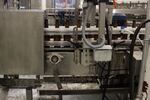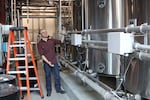
Bottles of beer are rinsed at Deschutes Brewery in Bend. A typical brewery uses seven gallons of water to brew one of beer. Deschutes Brewery is considerably more efficient: the ratio is more like 4-to-1.
Amanda Peacher / OPB
Rapid growth means big infrastructure challenges for any city. But in Bend, city officials are dealing with more than just the usual burden on roads and schools: The booming beer industry is straining the city's wastewater treatment system, too.
An average brewery uses seven gallons of water for every one gallon of beer brewed. Most of that water goes down the drain, into the sewer system and on to the wastewater treatment plant. The waste makes up a significant part of Bend's wastewater — 5 to 10 percent at the treatment plant.
"[The breweries] do take up a lot of space," said Kelly Graham, Bend's industrial pre-treatment program manager. "But that’s also what Bend is about anymore, the breweries. That’s why people come here."
Related: From Parking To Density, Bend Weighs Affordable Housing Ideas
And people are coming here. Seven new people a day move to Bend, according to assistant city manager Jon Skidmore. The city is building a new wastewater treatment plant and several new underground pipes to meet demand.
"With that volume of growth, we need these investments, we need these improvements because we just have the sheer amount of people that want to come to Bend," Skidmore said.
During the pre-recession years, Bend leaders approved new construction without fully charging developers for new infrastructure.
"The city’s utility rates, as well as system development charges that are relied on for a lot of capital improvement projects, definitely did not keep pace with the rate of growth," Skidmore said.
Now, the city is playing catch up with utility rates. Both residential and industrial sewer rates have gone up. Water users that discharge "extra strength" wastewater into the system are seeing particularly high increases, and that includes breweries.
"So we’d be paying well over a million dollars extra in sewer charges," said Ryan Reid, project engineer at Deschutes Brewery.
The city planned to increase Deschutes Brewery’s sewer rates by 316 percent in the next few years. The brewer decided that was too much, and instead is building its own on-site wastewater treatment facility.
How To Handle All That Water

Ryan Reid with Deschutes Brewery shows off one of the brew kettles at the flagship brewery in Bend.
Amanda Peacher / OPB
On an average weekday, the brewery hums with activity. Tall silver kettles house fermenting beer. In one large, airy room, beer bottles speed by on a production machine, on their way to being labeled and boxed.
"Every beer you find in a bottle comes from this facility right here," Reid said.
Like all breweries, Deschutes uses a lot of water.
"We’re a food plant. So we need to be very clean," Reid said. "We’re constantly washing things — not only the inside of the tanks but hosing down all the different areas."
Deschutes works to maximize water efficiency, Reid said. Most breweries average a 7-to-1 ratio between water to beer production. Deschutes is closer to 4-to-1.
Related: Bend's City Council Picks Its Mayor, And Some Councilors Want To Change That
Wastewater flows into a big underground vat. The liquid is a frothy brownish yellow — about the color of a pale ale.
"It does look like beer, and it’s mostly beer," Reid said. "But I wouldn’t drink it."
Deschutes already does some pre-treatment of wastewater on site before it gets to Bend’s treatment plant. But the city's cost increases made it too expensive to stay in the municipal system. Reid is currently testing water treatment options at the brewery, with an eye toward having a $9.5 million system in place sometime next year.
That’s not an option for smaller breweries such as the Crux Fermentation Project.
"It's absolutely devastating," said Larry Sidor, the head brewer at Crux.
Tourist Brad Liapis sat enjoying a cold IPA on a recent summer afternoon. He’s a tourist from Chico, California, and said beer brought him to Bend.
"If there wasn’t the breweries here we probably would have driven through and stopped somewhere else," he said.
But smaller Bend brewers like Crux may need to charge more to cover sewer rate hikes as the city continues to deal with its infrastructure needs.
Sidor estimates the added wastewater costs for his brewery will cost about the same as one fermenter, or roughly $65,000. "It's really affecting my ability to make more beer and hire more people."